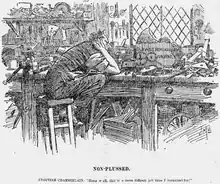nonplussed
English
Alternative forms
Etymology
|
|

From nonplus (“state of bewilderment or perplexity”, noun) or nonplus (“to bewilder or perplex (someone)”, verb) + -ed (suffix forming adjectives, and the past tense and past participle forms of verbs).[1] Nonplus (noun) is derived from Latin nōn plūs (“no further, no more”), from nōn (“not”) + plūs (“additionally, more; further”) (ultimately from Proto-Indo-European *pleh₁- (“to fill”)).[2] The etymological sense is similar to being left speechless as a result of confusion: the nonplussed person can say or do “no more”.
Sense 2 (“unaffected”) is probably from a misinterpretation of the first element of the word as the prefix non- meaning “not”.[1]
Pronunciation
- (Received Pronunciation) IPA(key): /nɒnˈplʌst/
Audio (Southern England) (file) - (General American) IPA(key): /ˌnɑnˈplʌst/
- Rhymes: -ʌst
- Hyphenation: non‧plussed
Adjective
nonplussed (comparative more nonplussed, superlative most nonplussed)
- Unsure how to act or respond; bewildered, perplexed. [from early 17th c.]
- Synonyms: confounded, vexed, lost for words; see also Thesaurus:confused
- Antonym: (informal) plussed
- 1724, [Daniel Defoe], The Fortunate Mistress; […] [Roxana], London: […] E. Applebee, […], published 1740, →OCLC, page 277:
- [N]ote the honeſt Quaker vvas nonpluſſed, and greatly ſurprized at that Queſtion.
- 1853 January, Currer Bell [pseudonym; Charlotte Brontë], “A Burial”, in Villette. […], volume III, London: Smith, Elder & Co., […], →OCLC, page 285:
- I could not discern what she meant, and I would not ask her: I was nonplussed.
- 1922 February, James Joyce, “[Episode 16: Eumaeus]”, in Ulysses, Paris: Shakespeare and Company, […], →OCLC, part III [Nostos], page 569:
- For the nonce he was rather nonplussed but inasmuch as the duty plainly devolved upon him to take some measures on the subject he pondered suitable ways and means during which Stephen repeatedly yawned.
- 1934 October 5, P[elham] G[renville] Wodehouse, chapter II, in Right Ho, Jeeves, London: Herbert Jenkins […], →OCLC, page 24:
- You couldn’t have told it from my manner, but I was feeling more than a bit nonplussed. The spectacle before me was enough to nonplus anyone.
- (chiefly US, informal, nonstandard) Unaffected, unfazed; unimpressed. [from mid 20th c.]
- Antonym: (informal) plussed
- 1960 August 2, “Cleric’s error was to win his wagers”, in Oakland Tribune, volume CLXXIII, number 33, home edition, Oakland, Calif.: Oakland Tribune, →ISSN, →OCLC, page E7, column 6:
- "I regard Dean [W. P.] Baddeley's gambling activities with embarrassment and dismay," said Anglican dean of Melbourne S. Barton Babbage. […] The Rev. Baddeley remained nonplussed. "I don't intend to make a habit of going to the races but I feel clergymen should mix as our Lord did with all walks of life," Dr. Baddeley said.
- 2002 April 14, Debra Pickett, “Sunday lunch with”, in Chicago Sun-Times, Chicago, Ill.: Chicago Public Media, →ISSN, →OCLC, page 24:
- And while many of us might be a little taken aback if Mom showed up at our offices, Secrist is utterly nonplussed, even happy about it.
- 2003 September, Gerald F. Kreyche, “John Charles Fremont and the Exploration of the American West”, in USA Today, volume 132, number 2700, New York, N.Y.: Society for the Advancement of Education, →ISSN, →OCLC, archived from the original on 2023-03-13, pages 52–57:
- One cannot help but wonder how the unnecessary death of 10 men sat on [John Charles] Fremont's conscience. From all appearances, he seemed nonplussed and never was remorseful or contrite.
- 2004 June, Shannon Thompson, “Houseboating on California’s Shasta Lake”, in Sunset, volume 212, number 6, Oakland, Calif.: Sunset Publishing, published 2 September 2004 (online), →ISSN, →OCLC, archived from the original on 2022-08-12, page 140:
- My screams woke everyone on the boat the first night when a large bat flapped up against the screen door to our small cabin, with its foam double beds. My brother-in-law, Mike, was nonplussed: "Why would you get excited over a little bug like that?"
- 2022 August 14, Joe Shute, “The rise and fall of the pride that inspired the Lion King”, in Chris Evans, editor, The Daily Telegraph, London: Telegraph Media Group, →ISSN, →OCLC, archived from the original on 2022-11-30:
- The lions in question were nonplussed. "They just stuck their noses into the wind, looked around and slumped down again into the grass," the now 73-year-old [Jonathan Scott] recalls.
Usage notes
Since the mid 20th century, originally in the United States, nonplussed has acquired the alternative sense of “unaffected, unfazed”. In 1999 this sense was considered a neologism,[3] and in 2005 it was still described as “not yet accepted as standard usage” by the Compact Oxford English Dictionary.[4]
Derived terms
- nonplussedness (rare)
Translations
|
References
- “nonplussed, adj.”, in OED Online
 , Oxford, Oxfordshire: Oxford University Press, March 2023; “nonplussed, adj.”, in Lexico, Dictionary.com; Oxford University Press, 2019–2022.
, Oxford, Oxfordshire: Oxford University Press, March 2023; “nonplussed, adj.”, in Lexico, Dictionary.com; Oxford University Press, 2019–2022. - “nonplus, n. and adj.”, in OED Online
 , Oxford, Oxfordshire: Oxford University Press, March 2022; “nonplus, n.”, in Lexico, Dictionary.com; Oxford University Press, 2019–2022.
, Oxford, Oxfordshire: Oxford University Press, March 2022; “nonplus, n.”, in Lexico, Dictionary.com; Oxford University Press, 2019–2022. - Carol (21 December 1999), “nonplussed”, in The Mavens’ Word of the Day, Random House, archived from the original on 2013-11-13
- Catherine Soanes, Sara Hawker (2005), “nonplussed, adj.”, in Compact Oxford English Dictionary of Current English, 3rd edition, Oxford, Oxfordshire: Oxford University Press, →ISBN.
Further reading
- Mark Liberman (6 August 2008), “Nonplussed about Nonplussed”, in Language Log, archived from the original on 2022-12-06.
- “Usage Notes: What’s Going On with ‘Nonplussed’?”, in Merriam-Webster Online, accessed 12 March 2023, archived from the original on 2023-03-01.